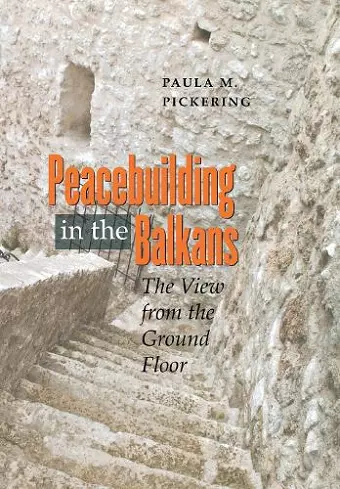Peacebuilding in the Balkans
The View from the Ground Floor
Format:Hardback
Publisher:Cornell University Press
Published:9th Nov '07
Currently unavailable, and unfortunately no date known when it will be back

After suffering years of war, Bosnia is now the target of international efforts to reconstruct and democratize a culturally divided society. The global community's strategy has focused on reforming political institutions, influencing the behavior of elite populations, and cultivating nongovernmental organizations. But expensive efforts to promote a stable peace and a multiethnic democracy can be successful only if they resonate among ordinary people. Otherwise, such projects will produce fragile institutions and alienated citizens who will be susceptible to extremists eager to send them back into war. Paula M. Pickering challenges the conventional wisdom that common people are merely passive recipients of peacebuilding projects. Instead, in Peacebuilding in the Balkans, she shows how ordinary people, particularly minorities in Bosnia, understand elite rhetoric and actively shape reconstruction.
Pickering's years of fieldwork—direct observation, interviews, and analysis of many surveys—has yielded a precise understanding of how ordinary citizens react to and influence peacebuilding programs in their neighborhoods, workplaces, municipal agencies, and other real-life social settings. The evidence suggests that international efforts to rebuild an inclusive Bosnia will be futile unless they pay sufficient attention to citizens' varying ties to ethnic groups, indigenous forms of civic activity, and the development of nondiscriminatory employment and responsive political institutions. Pickering's insights from reconstruction in the Balkans have important implications for peacebuilding elsewhere in Eurasia.
"Peacebuilding in the Balkans, the result of several years of on-site investigation and interviews, gives the reader an understanding of the situation with the added dimension of the use of the interviewees' own words." -- Francine Friedman, Ball State University
"The international community has invested billions of dollars in trying to restore Bosnia-Herzegovina as a functioning multiethnic state and society. A great deal of effort and research has gone into the design of programs to bring together divided communities. There is, however, very little understanding of how ordinary people in the affected communities cope. This is why Peacebuilding in the Balkans should be read by those making and implementing policy in Bosnia and the Western Balkans. Paula M. Pickering analyzes how the postwar reality in Bosnia affected the attitudes of ordinary citizens from minority groups toward members of the dominant ethnic group in their community." -- Tone Bringa, Chr. Michelsen Institute and the University of Bergen, Norway
"This detailed study of Bosnia explores one of the most pressing challenges facing the international community today—how to rebuild societies following bloody civil wars.... While much of the literature on post-conflict reconstruction... tends to focus on political elites, Picker focuses instead on how ordinary people respond to peace building projects designed largely without their input. The author bases her conclusions about how ordinary people—through ordinary, everyday actions—affect the success of post-conflict peace building programs on years of fieldwork and numerous interviews with Bosniaks, Croats, and Serbs. She supplements this rich, ethnographic data with quantitative analysis of ordinary people's attitudes toward other ethnic groups, political life, and institutions as well as voting patterns to present a complex picture of post-conflict Bosnian society."
ISBN: 9780801445767
Dimensions: 229mm x 152mm x 24mm
Weight: 907g
256 pages